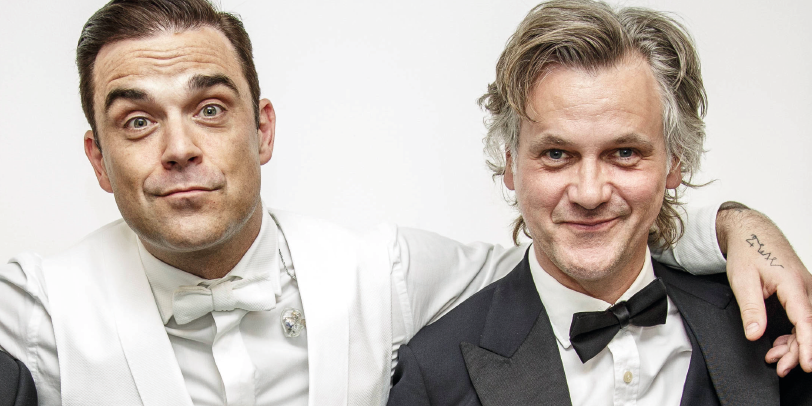After successful stints in World Party and The Waterboys, it was a memorable meeting with Robbie Williams in 1997 that would serve as the turning point for Guy Chambers, lifting his career to stratospheric heights. Here, the accomplished composer and songwriter tells us about his recent work, the Robbie years, and reveals how this unique partnership may never have materialised had it not been for the wise words of his mum.
It wasn’t a bad start for Guy Chambers and Robbie Williams when the pair first started working together. Undoubtedly a musical relationship that will go down in history, Chambers co-wrote an extensive and amazing list of tracks including Rock DJ, Feel, Millennium, Let Me Entertain You, and Angels, as well as working on Williams’ first five solo albums, which all reached number one.
Following 2002’s Escapology, Williams and Chambers went separate ways, with the latter going on to collaborate with other writers and artists for the next 10 years. They eventually reunited for 2013’s Swings Both Ways, 2017’s The Heavy Entertainment Show and 2019’s The Christmas Present, which, including Greatest Hits, brought the tally of number one albums that the pair have collaborated on to an incredible total of nine. Surely it makes sense then to make it a round number with 10?
“He does want to do another record, but obviously we can’t because of the situation,” says Chambers. “He’s in Los Angeles and no one can fly to America. Our relationship doesn’t work in different countries - we actually have to be in the same room together to create."
Chambers now wears many musical hats, but it was during his time with Karl Wallinger’s band World Party in the late ‘80s and early ‘90s when he discovered his love for writing:
“I would present songs to Karl and they’d often get rejected, but we did end up collaborating a bit,” he explains. “It was only when I formed my own band The Lemon Trees in 1992, with the first album Open Book, when I really got enough confidence to present them my songs and say this is what we’re going to do.
“I was about 28 or 29 by then so I was a late developer in pop music terms to be honest. It took me a long time to have the confidence, because you really need to have that if you’re going to be a good songwriter, going into a room with a stranger and co-writing or being on your own and presenting your songs to other musicians. You have to stand up for your work, and if someone knocks it, you’ve got to be able to take those knocks.”
It was also during the ‘90s when Chambers wrote with the likes of Cathy Dennis, best known for her work with Britney Spears. However, it wasn’t until Chambers met Robbie Williams in 1997 that his career really took off:
“I was earning a living before then, but I was really scratching around to be honest. It was very up and down,” he recalls. “I definitely knew straight away that it was going to work though. We wrote a song called South of the Border on the first day, which was one of the singles on the first album, and then on the second day we wrote Angels. The second day session was actually very short because I had a terrible sinus infection, and so we ended up writing Angels in an hour because I was in so much pain.”
Chambers is a strong believer of the showbiz adage “the show must go on”, and has subsequently never missed a show in his life. “I’ve been in all sorts of trouble with viruses and whatnot over the years, but we call it Dr. Showbiz - once you get on the stage to do it somehow he lifts you, and you just get through it.”
In fact, it was a twist of fate that caused Chambers and Williams’ paths to cross in the first place:
“Something I would say to young songwriters is, if you’ve got a date with destiny like with somebody you’re going to be writing with, don’t cancel on that person unless you have a really, really good excuse. I wanted to cancel that day, but my mum fortunately intervened. I phoned her up before Rob arrived and I said, ‘I really want to cancel because I felt that terrible.’ She said to me ‘look Guy, I’ve got a good feeling about today. Whatever you do, don’t cancel - just get through it.’ And she was right.
“Angels started with him walking in the room and singing this beautiful melody and beautiful words. I just sat at the piano and guessed the key because I’m normally quite good at that. I just dived in and it was in E major so I started playing the chords, and then somehow when he went to the next section he just kept on singing without any gaps. It was really weird - I think he had all of the words of the verse already written in his head.





